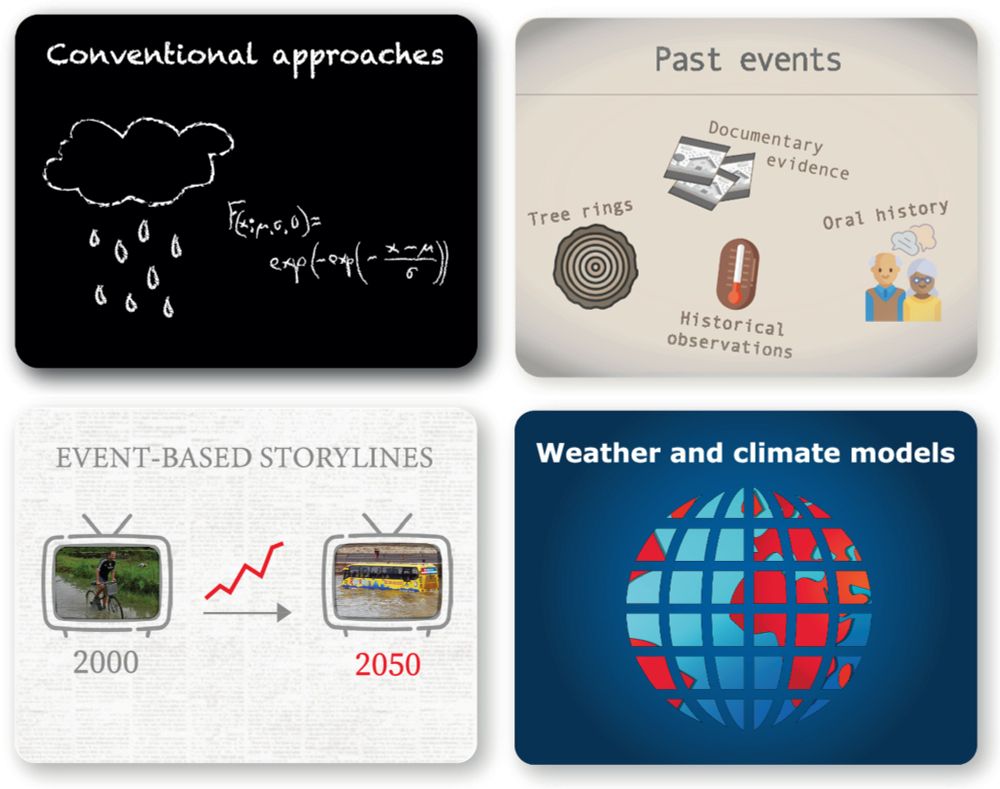The answer can be challenging. Our new review paper in Science Advances led by Isla Simpson and Tiffany Shaw @drshaw.bsky.social discusses challenges and ways forward in confronting climate models and observations.
www.science.org/doi/10.1126/...

The answer can be challenging. Our new review paper in Science Advances led by Isla Simpson and Tiffany Shaw @drshaw.bsky.social discusses challenges and ways forward in confronting climate models and observations.
www.science.org/doi/10.1126/...
📽️ Watch this short video to learn more! 👇@naturecomms.bsky.social

www.nature.com/articles/s41...

www.nature.com/articles/s41...
Our new @naturecomms.bsky.social paper provides our multi-author perspective on methods to anticipate extreme weather and reduce impacts, shifting from reacting with surprise towards resilience.
🔗 Read it here: doi.org/10.1038/s414...
🧵⬇️

More transformative adaptation in advance to ensure greater resilience means less reactive adaptation required when the unprecedented event occurs.

More transformative adaptation in advance to ensure greater resilience means less reactive adaptation required when the unprecedented event occurs.
Our new @naturecomms.bsky.social paper provides our multi-author perspective on methods to anticipate extreme weather and reduce impacts, shifting from reacting with surprise towards resilience.
🔗 Read it here: doi.org/10.1038/s414...
🧵⬇️

Transformative adaptation, foundation for long-term resilience, supported by incremental adaptation through upgrading existing infrastructure, and reactive adaptation - early action and disaster response.
www.nature.com/articles/s41...

Transformative adaptation, foundation for long-term resilience, supported by incremental adaptation through upgrading existing infrastructure, and reactive adaptation - early action and disaster response.
www.nature.com/articles/s41...
Kelder et al. discusses a multitude of ways that we could anticipate unprecedented weather events that might otherwise be a surprise
rdcu.be/ecWQF

Kelder et al. discusses a multitude of ways that we could anticipate unprecedented weather events that might otherwise be a surprise
rdcu.be/ecWQF

Kelder et al. discusses a multitude of ways that we could anticipate unprecedented weather events that might otherwise be a surprise
rdcu.be/ecWQF

Includes a review of methods to anticipate events, and discussion on adaptation practice and disaster management.
Kelder et al. discusses a multitude of ways that we could anticipate unprecedented weather events that might otherwise be a surprise
rdcu.be/ecWQF

Includes a review of methods to anticipate events, and discussion on adaptation practice and disaster management.
Our new @naturecomms.bsky.social paper provides our multi-author perspective on methods to anticipate extreme weather and reduce impacts, shifting from reacting with surprise towards resilience.
🔗 Read it here: doi.org/10.1038/s414...
🧵⬇️

Our new @naturecomms.bsky.social paper provides our multi-author perspective on methods to anticipate extreme weather and reduce impacts, shifting from reacting with surprise towards resilience.
🔗 Read it here: doi.org/10.1038/s414...
🧵⬇️
PART I: A 🧵 on adaptation and development over the years, digging deep back to the 1990s through to current scholarship.
After a year of countless record-breaking extremes, we organize (again) an #EGU24 session on understanding and quantifying such high-impact climate events and developing storylines for them!
Submit your abstract here:
meetingorganizer.copernicus.org/EGU24/sessio...

After a year of countless record-breaking extremes, we organize (again) an #EGU24 session on understanding and quantifying such high-impact climate events and developing storylines for them!
Submit your abstract here:
meetingorganizer.copernicus.org/EGU24/sessio...

